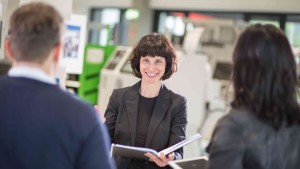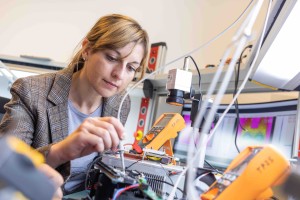‘To me the balance between life and work never exists. There is only life, and work is an extension to your personality.’ Being in the leadership team of the fortune 500 organization Kelly OCG, Mr. Strangas shared with us his take-away as being a “Master of International Management” student at FH JOANNEUM in Graz, his thoughts to the rise of emerging markets and his philosophy of life in the interview.
Mr. Strangas is a seasoned Supplier & Industry Relations practitioner and firm believer in ethical recruitment practices in the ever globalizing & complex talent supply chain. Currently in Kelly OCG’s regional talent supply chain lead for Asia-Pacific, he acts as the main interface between Kelly Services and its vast network of talent supplies, and manages a workforce service worth of $515m-800m each year. Mr. Strangas is also the representative of Kelly OCG in the International Labor Organization’s tripartite consultation, dedicating to eradicating unethical hiring practices in particular for cross boarder migrant labor.
Have you been able to relate what you have learned in MIG (Master of International Management) to your work experience?
Yes, the ability to adapt to the real world—the ‘so what’ question that is derived from the knowledge that the teachers and the textbook taught us. To have the right blend between the theories’ framework and its relevance to the industry was part of my expectation when I joined FH JOANNEUM. As an applied science university, FH JOANNEUM has more industrial practices and experience to offer. So along the line of you fake it till you make it, simply applying what you’ve learned from the textbook is not enough to let you take off. It is important to learn how real business operates as a whole entity, and how each individual is interconnected on a daily basis. In light of this, the practical side of FH JOANNEUM has definitely helped me to adjust my behavior to the assigned workplace in such a way that I can quickly come up to the speed.
For those like-minded European students who are planning their careers in Singapore/Asian Pacific Region, what do you think is the challenge and opportunity out there?
Nowadays, not only in Singapore, but also in China, India, there is a much stronger influx of young western talents. For western young talents, they are not only competing with the locals, but also with their fellows. It is becoming increasing difficult for the young talents to stand out, and for the company to justify their decisions of hiring a foreign talent over a local one. More important, the education that the local university offers, particularly in emerging markets, China, India, Indonesia, Thailand, has improved drastically, not only in numbers, but also in its quality. From what I read from books and what I have seen and experienced, the potential of the mid-size German companies is very strong yet often underestimated. Therefore, my advice is: to join a German speaking mid-size organization that has a focus on emerging markets, and to grow up with the company until you reach the point that you are qualified to be posted oversee by these organizations. For me, this is the best starting point. Once you are there, there will be plenty of opportunities awaiting you.
As a person with high achievement in your career, how do you maintain the balance between work and life?
That does not really exist for me. My wife is a general manager in one of the leading online travel agencies—Expedia China, and I am proud to say that I am part of the leadership of a fortune 500 organization. So we are both in a role where the organization is expecting you to make the work for yourself. I do believe that what we have is just a life, and we need to make the best out of it. One important thing to think about is to understand: why are you doing something? By the time I can no longer answer this question, I will need to think about work-life balance, because work is just a means to make a living and nothing more. As long as you can see the value that work brings to you beyond simple financial compensation, you do not see work as only work, but as the extension of your personality: I like to talk, I like to foster relationships… I was reading my graduate magazine and encountered the words I said years ago: ‘I like to make the world a better places’—very naïve, but it is true. Giving the role that I am doing, I am exactly doing that. I help to eradicate unethical recruitment, I help to abolish and reduce slave labor, I help some people to get out of situation of economic abuse etc.. So I have an answer for the question of why I am doing what I do. Thus, I am not seeing my work only as work.
Is it necessary for students to know more about emerging markets, even though they are simply planning their careers in Europe?
Yes, definitely. With the advance of the BRIC nations—even though they are not as stable as we thought they would be—the power equilibrium between the developed countries and the developing ones has shifted drastically. The traditional role that westerners as exporters, bringing innovation and products to the third world, is changing drastically. Nations such as China and India, they are becoming the exporters to here. Therefore, even though people might not have the interest of physically relocating in the emerging markets, they need to be sensible to the existence of the emerging markets, to have an expertise of the emerging markets, and to understand that we are dealing companies with different cultural environments, different market reality. For example, in the negotiation process, the moment that one comes to realization that the person who sits opposite to me, has the same good intention, but just sees things from a different angle, has already helped break down the conflicts. Unfortunately, awareness does not come naturally. It requires some exposure, it needs to be fostered on people, through courses of emerging markets, through experience abroad, through stepping out of the comfort zone and immerse oneself into a new environment.
Some suggestions to students from Mr. Strangas during his guest speech in FH JOANNEUM
Where there is a will, there is a way’
‘Don’t blame circumstances, blame the choices you make in life’
‘My job is all about communication, communication, communication’
Referring to the most powerful way of being successful in this business: ASK QUESTIONS! Don’t act as if you know everything – ask as many questions as possible!
‘Competition in Singapore has drastically increased. Expat newcomers must compete with national talents who are also drastically improving’
‘Work is an extension of your personality’









